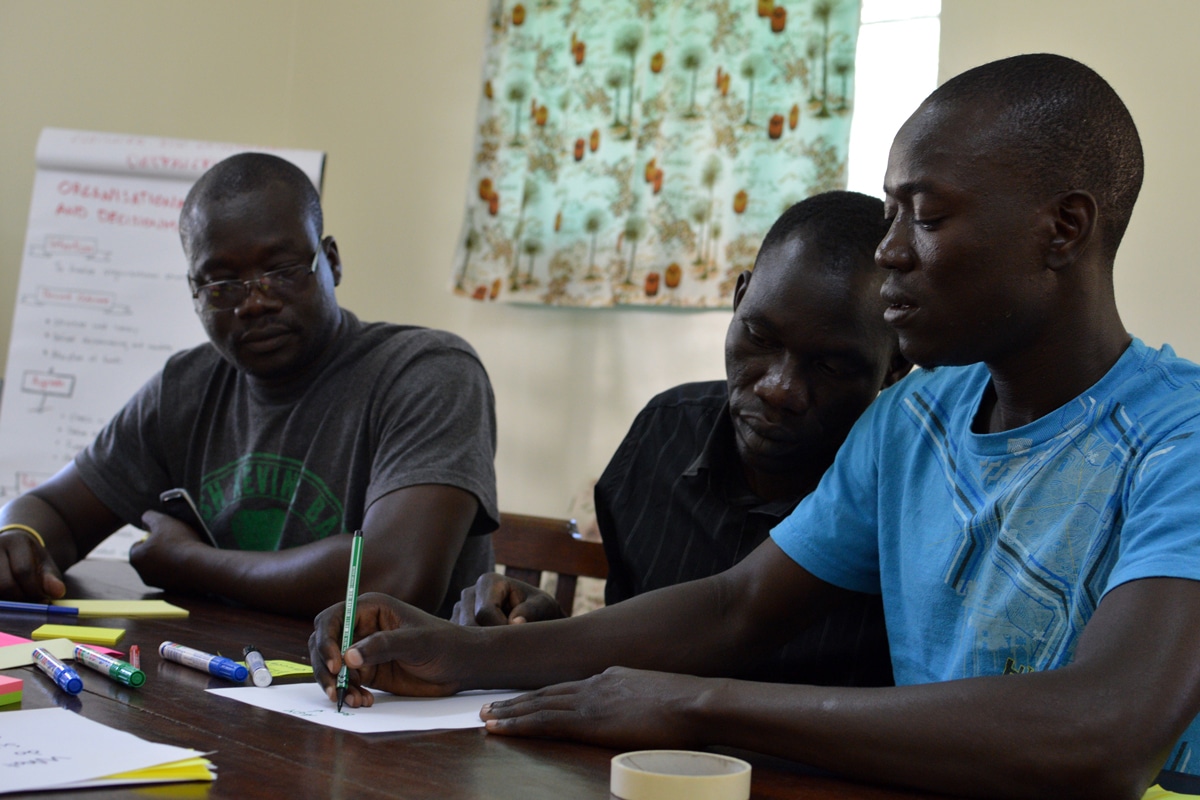Former Child Soldiers in Uganda take the Lead
by Jimmie Briggs, Goldin Institute Board of Advisors
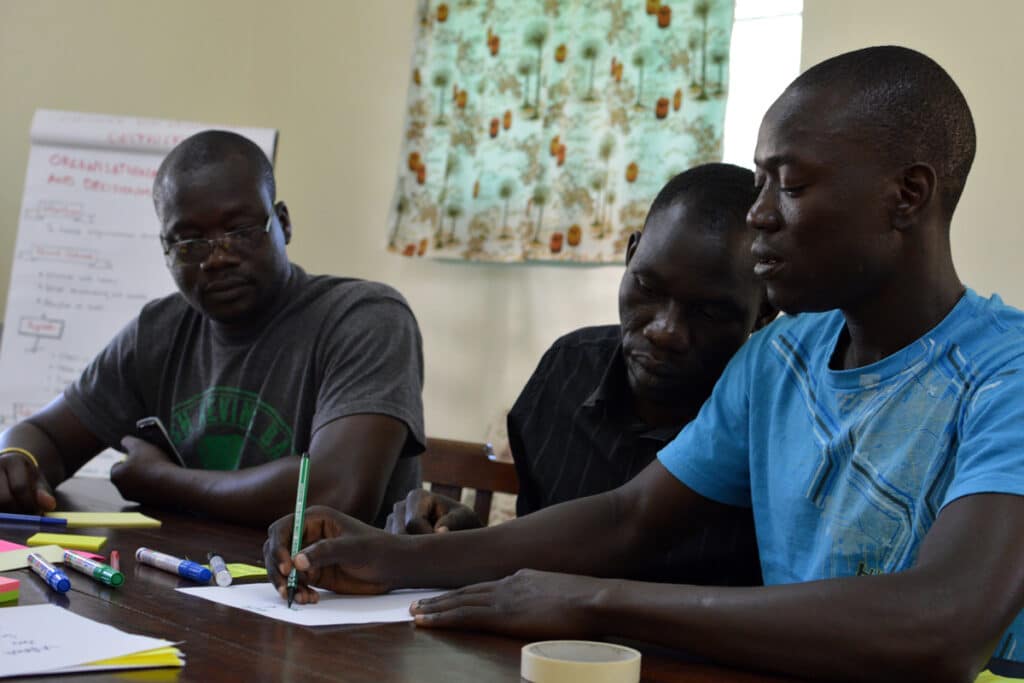
For nearly three decades starting in the late 1980’s, over 60,000 girls and boys in Northern Uganda were forcibly conscripted into fighting a guerilla war against their government, under the brutal domination of the Lord’s Resistance Army. In war that displaced 1.5 million people mainly of the Acholi ethnic group from communities such as Gulu and Kitgum, as well as the areas surrounding them, children bore an overwhelming weight not only as combatants, but also in carrying a stigma which has typically left them marginalized and overlooked as young adults today.
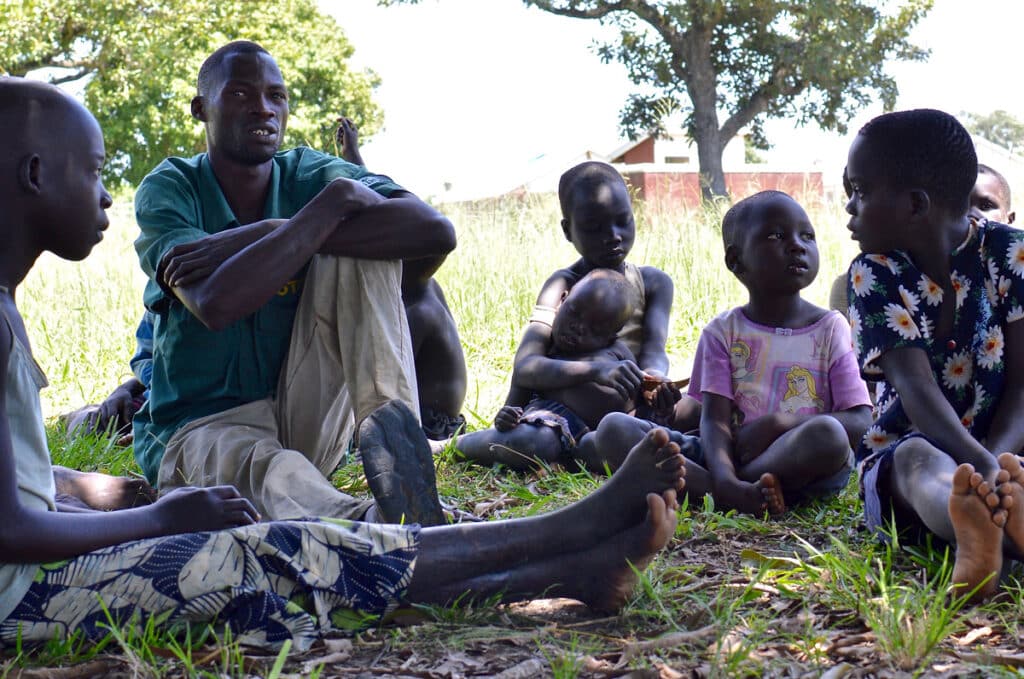
YOLRED, or the “Youth Leaders for Restoration and Development,” aims to address the challenges endured by former combatants with a key distinction which separates it from other well-meaning NGOs (non-governmental organizations) both local and international: YOLRED was founded by formerly abducted child soldiers to serve other young adults with the same shared experience. It is the only group of its kind to be designed, founded and led by members of the community which it serves.
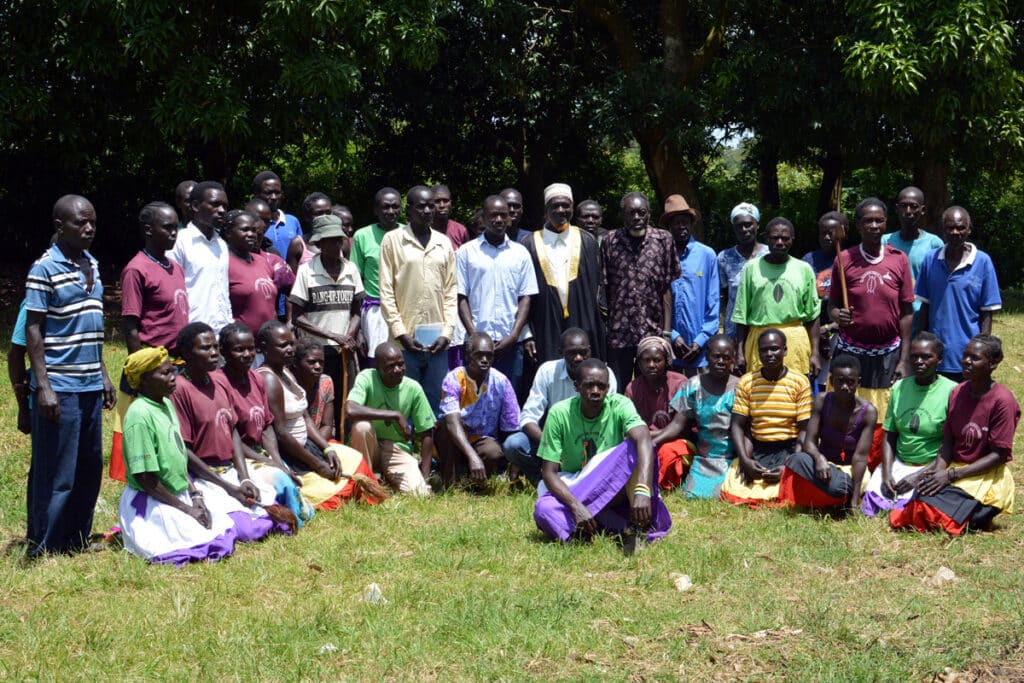
Its origins come out of mobilization of just under 200 former combatants from across Northern Uganda to capture and document oral testimony about their respective experiences in the civil war. Through a partnership with the Goldin Institute and local supporters, the core team of YOLRED led the effort to collect over 150 peer-to-peer interviews with former abductees about their experiences and insights.
Not unlike child soldiers in other countries who are undergoing the formal DDR (Disarmament, Demobilization and Reintegration) process without long-term support, many of those individuals who participated in the story collection project recounted being stigmatized, left homeless and struggling in poverty. The Goldin Institute in partnership with Arigatou International and Cartitas Counseling Training Institute worked with regional Ugandan leaders to support these child soldiers to assume agency and leadership over their own destinies.
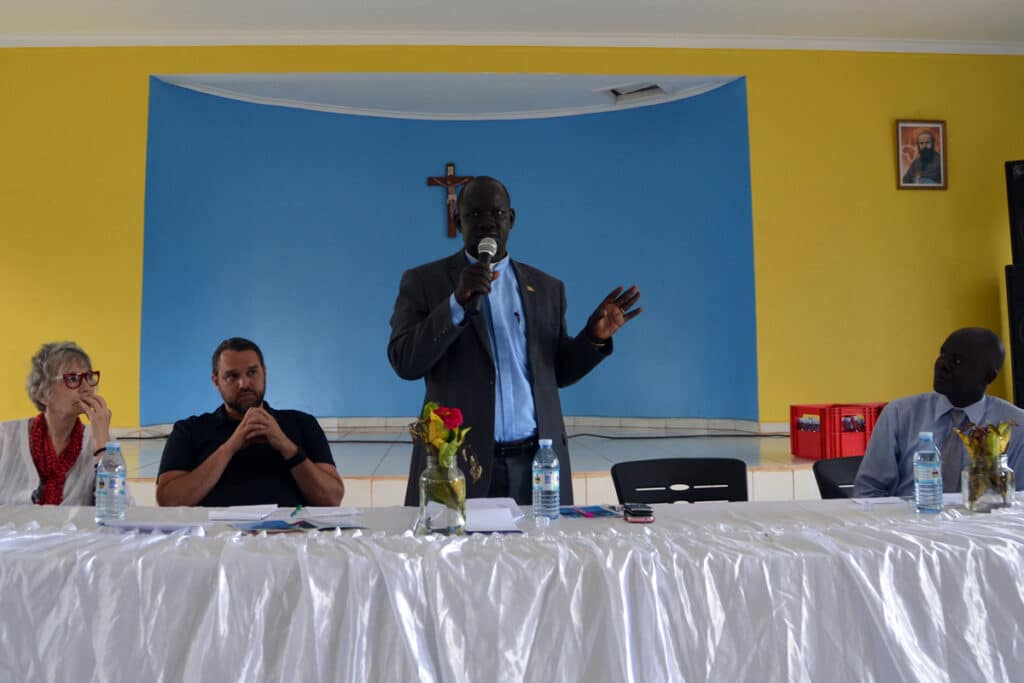
Equipped with this knowledge and the sense of solidarity developed through the research process, these community researchers produced the “Alone and Frightened” report to restore these voices to the conversation about reintegration and laid the foundation for an organization dedicated to achieving the aspirations of former combatants.
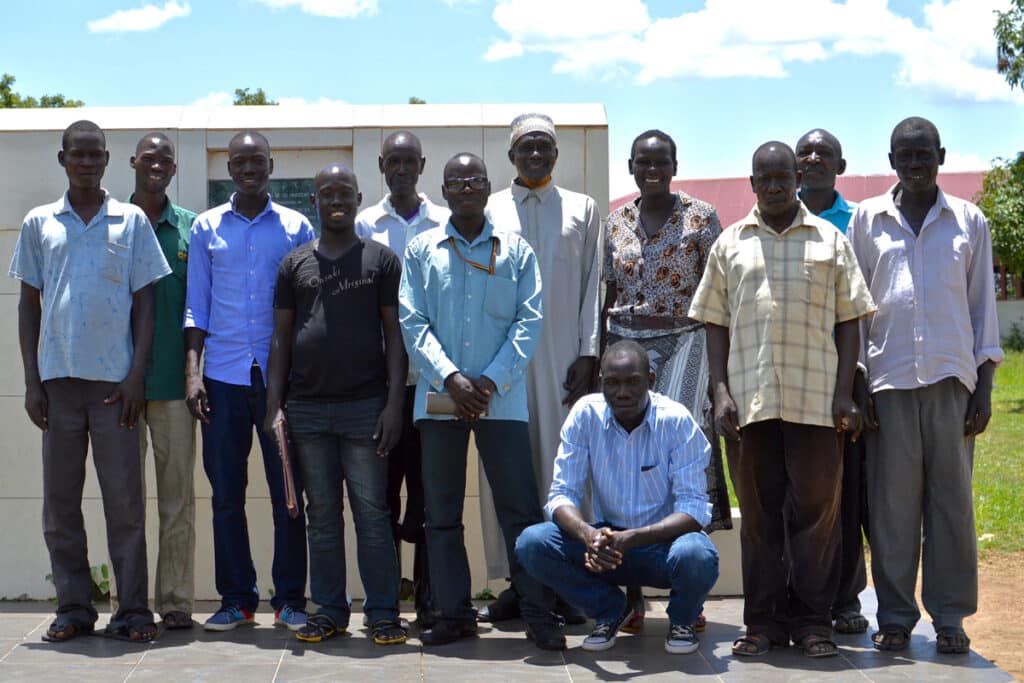
In a ceremony attended by partners from the Goldin Institute and a wide range of local partners, YOLRED was officially launched on August 27, 2016 in Gulu after years of careful planning, listening and outreach. YOLRED’s five co-founders – Geoffrey, Charles, Janet, David and Collins -- seek to support all young people who were impacted by the civil war, including ex-child soldiers, abductees, the displaced, the children of former abductees and child mothers throughout Northern Uganda. Indicators of well-being including health, education, employment and livelihood, as well as peace and security. The team is actively restoring the communities that were torn apart by the conflict and taking steps to prevent the abduction of children into conflict in the future.
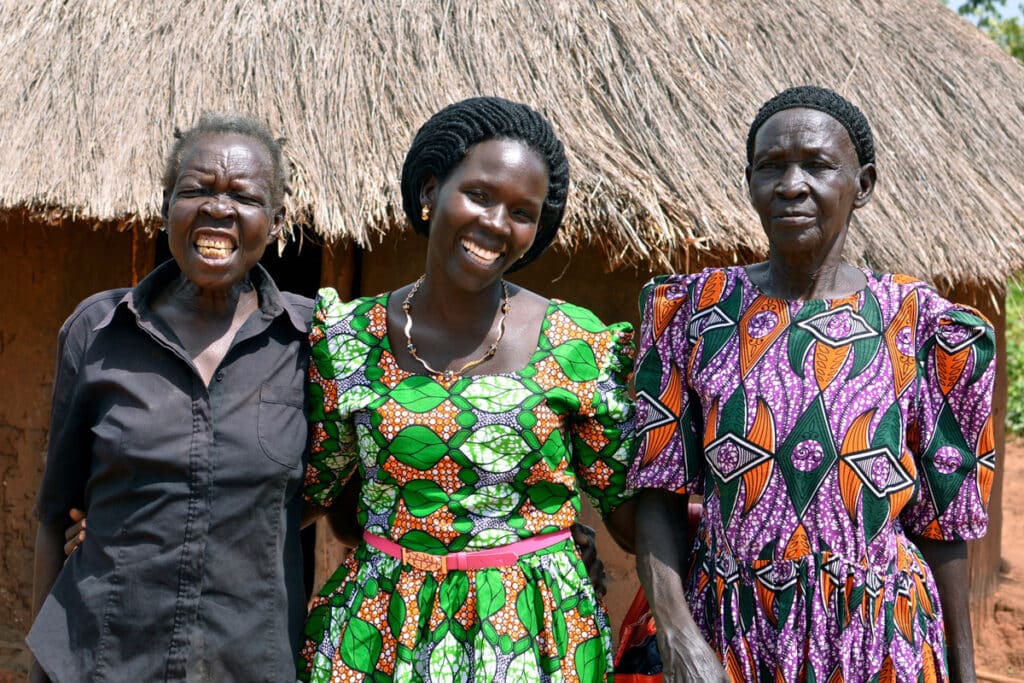
In preparing for the launch of YOLRED, the team partnered with the Goldin Institute, Arigatou International and Anorak who worked with YOLRED’s leadership to develop a five-year plan detailing its organizational structure and its primary initiatives including reconciliation, entrepreneurship and agriculture.
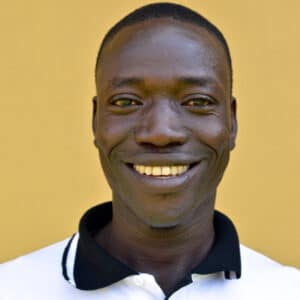
"I am happy for Youth Leaders for Restoration and Development, as a platform for former child soldiers. As a leader of the organization, I will [help] ensure that our problems and the solutions are implemented are locally. The output of this organization must be felt and seen in the communities." -- Geoffrey Omony, Co-Founder, YOLRED
Further, the credit union scheme is not only intended to provide low and no interest loans but also financial literacy for those without bank accounts nor a credit history. Grassoots entrepreneurs will be supported in their start-up efforts and encouraged to be peer mentors to others seeking to create businesses or authentic leadership in civil society and government. YOLRED will be critically evaluating all of its programming at key stages of its development.
Presently, the organization is applying for support from the IDEO Youth Empowerment Challenge, as well as Echoing Green for general operations as well as capacity building.
We invite you to learn more about YOLRED and how to get involved at www.yolred.org.
Follow Along as Former Child Soldiers Launch Reintegration Organization

August 27th Update:
I am pleased to announce that YOLRED, the first platform for Child soldier reintegration and rehabilitation in Africa that is owned and run by the former combatants themselves, is officially launched and up and running. Our work with the YOLRED team in Uganda ended with a public gathering to celebrate the official launch of the platform.
The team was able to share their vision with the public and was received with support from the community and different official stakeholders, NGO's and religious institutions. You can download the brochure that was distributed at the launch event here.
It has been an honour to see the fruit of over four years of hard work come to a big milestone, see the members of YOLRED rise and start to carry out a vision they have had on the inside for years. View our most up-to-date slideshow below:
[slide]
[img path="images/AnorakUganda010.jpg"]YOLRED Leaders Participate in Workshop on Strategic Planning[/img]
[img path="images/AnorakUganda011.jpg"]YOLRED Leaders Meet with Community Partners Throughout Gulu[/img]
[img path="images/AnorakUganda013.jpg"]YOLRED Leaders Participate in Workshop on Strategic Planning[/img]
[img path="images/AnorakUganda014.jpg"]YOLRED Leaders Participate in Workshop on Strategic Planning[/img]
[img path="images/AnorakUganda015.jpg"]YOLRED Leaders Meet with Community Partners Throughout Gulu[/img]
[img path="images/AnorakUganda016.jpg"]Anders from Team Anorak meets with Grassroots Community Leaders in Gulu[/img]
[img path="images/AnorakUganda017.jpg"]YOLRED Leaders Meet with Community Partners Throughout Gulu[/img]
[img path="images/Anorak_August2016/dianeG.jpg"]GI co-founder Diane Goldin meets with community leaders on the project[/img]
[img path="images/Anorak_August2016/w_danes.jpg"]YOLRED Leaders and ANORAK organizers, Morten and Anders enjoy casual moment for photo opportunity[/img]
[img path="images/Anorak_August2016/geoffery_work.jpg"]Team leader Geoffery meets with Grassroots Community Leaders in Gulu[/img]
[img path="images/Anorak_August2016/trav_trav.jpg"]GI Executive Director Travis Rejman with colleague Charles Okelo and family[/img]
[img path="images/Anorak_August2016/women_colors.jpg"]YOLRED participants display the local colors[/img]
[img path="images/Anorak_August2016/dianeG.jpg"]GI co-founder Diane Goldin meets with community leaders on the project[/img]
[img path="images/Anorak_August2016/w_danes.jpg"]YOLRED Leaders and ANORAK organizers, Morten and Anders enjoy casual moment for photo opportunity[/img]
[img path="images/Anorak_August2016/geoffery_work.jpg"]Team leader Geoffery meets with Grassroots Community Leaders in Gulu[/img]
[/slide]
Currently we are supporting the team in enacting their communications and outreach plan for both local and international supporters. In particular, we are providing some consultative support over the next two weeks to help them create their own website as an ongoing place of information and updates from YOLRED. Watch for an announcement in the next newsletter for the new website!
Now lies a lot of hard but exciting work for YOLRED, but with great support from the Goldin Institute, Arigatou International and wise partners on the ground, the team feels equipped and empowered, ready to reach out to their communities. We are very excited to follow the team’s progress in this coming period.
August 20th Update:
The Uganda team is working late hours these days with Team Anorak to be ready for the launch of YOLRED that will take place in only 6 days. The team is mobilising the community though many visits to local leaders and various sites in northern Uganda, they are also putting final touches on their leadership structure and preparing all the details for the launch next Saturday.
August 19th Update:
Along with my colleague Morten, I am pleased to share an update from our first week here in Gulu, Uganda with our partners from the emerging organization, Youth Leaders for Restoration and Development (YOLRED). We are inspired by the wisdom, creativity and passion that the former child soldiers of Uganda bring to the leadership of creating and managing their own organization. For the first time, former child soldiers themselves will determine their own strategies for reintegration and prevention.
To help finalize the organizational design, we have facilitated several workshops, helping the YOLRED team clarify and document the mission, vision and principles of this new organization.

We have also together made great progress in defining the organizational structure and plan to ensure that these young leaders will have the platform and support they need to acheive their ambitious mission.
These discussions with the YOLRED leaders have been informed by a wide range of key stakeholders including leading NGO’s, government offices, religious leaders and family members.

[block title="We can see the work over the past week has been crucial on two parallel levels" bg="#ce7019"]
First, through our conversations with community partners, we are raising awareness and enthusiasm among the stakeholders in the area. At the same time, this highly creative processes with the YOLRED team is designing solutuions to the missing pieces of their strategy and bringing a deep and inspiring cohesion and shared vision with the team.
[/block]
We look forward to keeping you updated as we move towards the public launch of YOLRED in the coming weeks.
If you have questions or suggestions, we're happy to hear for you.
Sincerely,
Anders and Morten, Team Anorak
Alone and Frightened: A Summary of our Report
 In the discussions about disarmament, demobilization and reintegration of children used as soldiers in the conflict in Northern Uganda, the voices and perspectives of former child soldiers themselves have too often and too long been ignored.
In the discussions about disarmament, demobilization and reintegration of children used as soldiers in the conflict in Northern Uganda, the voices and perspectives of former child soldiers themselves have too often and too long been ignored.
To restore these voices to the discussion and to improve the services for former combatants, the Goldin Institute and local partners trained a group of former child soldiers in "Community Based Oral Testimony" as a tool for gathering these stories and perspectives. Through this project, former child soldiers themselves led the research collection through interviewing over 150 of their peers and together reflecting on common concerns and shared aspirations.
The results of this groundbreaking research are contained in the report, Alone and Frightened. Equipped with this knowledge and the sense of solidarity developed through the research process, the former child soldiers are now at the forefront of convening the National Platform for Child Soldier Reintegration in Uganda as a network for coordinating the work of NGOs, government agencies, religious communities and other partners who are working together to promote reconciliation and reintegration.
[quote]Child Soldier definition: A child soldier is one under the age of 18 and part of a regular or irregular armed force or armed group participation directly indirectly. Child soldiers perform a range of tasks including combat, laying mines, and explosives; scouting, spying, acting as decoys, couriers or guards; training, drill or other preparations; logistics and support functions, pottering, cooking and domestic labor; and sexual slavery or other recruitment for sexual purposes."[/quote]
- UNICEF 2003
 This study describes the state of children affected by the brutal war in Northern Uganda pitting the Lord's Resistance Army (LRA) against the Uganda People's Defense Forces (UPDF). These are stories of Former Child Soldiers (FCS), please use your discretion as these stories are both horrific and heart-rendering.
This study describes the state of children affected by the brutal war in Northern Uganda pitting the Lord's Resistance Army (LRA) against the Uganda People's Defense Forces (UPDF). These are stories of Former Child Soldiers (FCS), please use your discretion as these stories are both horrific and heart-rendering.
The study sought to achieve the following objectives:
- To facilitate a platform for FCS to share their experiences and challenges of abduction and escape from captivity.
- To establish the community and family perceptions and attitude towards FCS.
- To identify gaps in the implementation of the Cessation of Hostilities/Juba Peace Agreement (CHA) (2006), agenda item V on DDR, the institutional mechanisms and the current state of FCS with regard to DDR.
- To establish and highlight the locally-generated and FCS-based frameworks for reintegration.
- The content scope of this research was to document and analyze the experiences and challenges of FCS with regard to their reintegration into families and communities within the CHA broader agenda item V.
Design:
A total of 180 primary informants were purposely selected out of 264 interviewed using the principles of participatory feedback and primary respondent-centered ownership of the research. Of respondents, 52% were male, and 48% were female.
Key Findings:
Females seemed more unwilling to respond to the the participation due to fear of being identified, fear of community reprisal or, a manifestation of inadequate or lack of psycho-social support.
- The majority of children abducted (58.9%) were 15 years of age and below, a clear indication of loss of childhood including schooling for many, in addition to horrifying traumatic experiences.
- Major health issues were identified among FCS including bullet wounds and fragments in the body, septic wounds, fistula, HIV/AIDS and cardiac problems.The physical scars or bullets lodged in their bodies has rendered some of them unable to find spouses or fend for themselves.
- Of the 87 females interviewed, 39 returned as child mothers.
- While 60% of the abducted children found themselves in the hands of Uganda People's Defense Forces (UPDF) and later reception centers, many (40%) did not receive initial counseling and support. Many experienced constant death threats, spiritual initiation rituals ranging from sitting on dead bodies to having sex with an older person, lasting 1-6 years in captivity. Thus, one can understand the extreme levels of trauma and lack of livelihoods among FCS currently.
- Large portions of FCS expressed concerns of psychological suffering and/or trauma as a result of their experiences in captivity, including but not limited to, nightmares, anxiety and fits of anger, as well as alienation, appropriation, dispossession, guilt, loneliness, and poor relation with others (aggression, shouting, commanding, etc.).
- Over half found either one or both parents dead. This means a sizable number returned as orphans, with a greater number losing their fathers.
To learn more about the next steps and the multi-sector network promoting reintegration and reconciliation, click here to read about the work of the National Platform for Child Soldier Reintegration and Prevention in Uganda.
The following slideshow includes recent ESPERE workshops featuring our colleagues in Uganda and Kenya. Many of the participants represent the aspirations detailed in the Alone and Frightened Report.
[slide] [img path="images/slideshow/full/uganda2014_1.jpg"]Co-founder's Diane Goldin and Travis Rejman meet with Everest Okwonga, the Principal at St. Janani Luwum Vocational Training Centre[/img] [img path="images/slideshow/full/uganda2014_2.jpg"]Co-founder's Diane Goldin and Travis Rejman meet with students at a trade school for former child combatants in Gulu[/img] [img path="images/slideshow/full/uganda2014_3.jpg"]Co-founder Diane Goldin meets with students in a Gulu classroom during the Institute's June2014 trip to the region to take part on child soldier reintegration efforts[/img][img path="images/slideshow/full/uganda2014_4.jpg"]Participants of a workshop conducted by Global Associate Lissette Mateus Roa take part in one of the exercises teaching 'forgiveness'[/img][img path="images/slideshow/full/uganda2014_5.jpg"] Global Associate Lissette Mateus Roa (bottom left) and her group of ESPERE students. Also included is friend and colleague and Associate emeritus Dr. Dorcas Kiplagat (standing 5th from right)[/img] [img path="images/slideshow/full/uganda2014_6.jpg"]Participants of the ESPERE workshop during a training session[/img][img path="images/slideshow/full/uganda2014_7.jpg"]Global Associate Lissette Mateus Roa (standing) leads a training session in Gulu[/img][img path="images/slideshow/full/uganda2014_9.jpg"]Global Associate Lissette Mateus conducts an exercise with participants of the ESPERE workshop in June 2014[/img][img path="images/slideshow/full/uganda2014_15.jpg"]Global Associate Lissette Mateus (sitting foreground) leads her ESPERE training group[/img][img path="images/slideshow/full/uganda2014_28.jpg"]Co-founder Diane Goldin meets with students at the St Janani Vocational School. The School is made up of mostly former child soldiers learning new skills (like carpentry in this classroom) to rejoin civilian life.[/img] [img path="images/slideshow/full/uganda2014_27.jpg"]The workshop attended by former child combatants[/img][img path="images/slideshow/full/uganda2014_34.jpg"]Institute co-founder Diane Goldin meets with Ajok Dorah - a psychologist specializing in giving counsel to former child combatants returning to their communities.[/img][/slide]
Poignant Child Soldier Stories Connect with Wider Audience

In our own efforts to try and get the word out about the plight of child soldiers, and the progress that is being made towards former young combatants we work with in returning to civil society – we're always interested in new ways to connect with those who wish to help.
Visiting our website, you will find the personal stories of those involved in bringing attention to the issue, while they also work on sustainable and proven ways to create positive change in their communities, so that fomer child soldiers have opportunites for positive change in their own lives. Whether bringing you the ongoing project work we are doing in Colombia and Latin America with our two associates Lissette and Fr. Leonel, or updating you on the expansion of the successful national platform we helped develop with our colleagues on the ground in Uganda, we continue to explore ways to make a difficult story to tell, more compelling and personal to those who wish to make a difference by knowing the stories.
With that in mind, we are excited about a 'retelling' and fresh way of letting you know about our work in child soldier reintegration. In coming weeks, we'll look at ways to adapt a more personal approach to feature some of the key voices that have inspired us to stay committed to the issue.
Until then, we invite you to view the work by someone who is already telling the ordeal of the child soldier in a new way. With interactive storytelling, Marc Ellison and his graphic novel style communicates the plight of several former female child soldiers, but still conveys the hopefullness of those having the courage to tell their story. Ellison's work is featured in this profile story. A link depicting the story of one of the former child soldiers (Christine) is at Ellison's site.

Colombia Brings Reconciliation Methods to Uganda
In the tradition of the Goldin Institute's Forgiveness and Reconciliation Project, and utilizing the ESPERE methodology developed with our colleagues in Colombia, our efforts towards building child soldier reintegration continues throughout Northern Uganda.
As our Global Associate on the ground in Uganda (Denis Okello) recently reported to us in this summary paper, both Kitgum and Amuru districts have suffered greatly from armed violence and conflict. The instability in the area results in the ongoing recruitment and coercion of countless adults and children into the rebel forces. As Denis tells it, "in some way or capacity, each and every household in Northern Uganda has suffered the direct effects of the conflict in terms of abduction, death, displacement, poverty or illness." Against this backdrop, both districts serve as ideal communities to workshop the methods of ESPERE, bringing effective training to those within the community wishing to cope with the effects of war – and also those hoping to better their lives.
 In the Kitgum District, Denis' report focused on a workshop conducted specifically for secondary and vocational school teachers. Here, educators could be equipped with the knowledge and skills on the process of forgiveness and reconciliation in order for them to effectively respond to the needs of their students who have been directly impacted by the civil war that they have grown up in.
In the Kitgum District, Denis' report focused on a workshop conducted specifically for secondary and vocational school teachers. Here, educators could be equipped with the knowledge and skills on the process of forgiveness and reconciliation in order for them to effectively respond to the needs of their students who have been directly impacted by the civil war that they have grown up in.
In the Amuru District, Denis overviewed the specific training to former child combatants, young mothers, and orphaned young adults of the conflict who have been left to become the 'heads' of their households. Denis provided the history and background, and explained that within Amuru, the sub-county of Pabbo was one of the first and largest camps for Internally Displaced People (IDPs) during the LRA War between 1986 and 2006. After the end of hostilities in 2006, the displaced persons, former combatants, victims of atrocities and children born from captivity within the LRA, flooded back to many parts of Pabbo. It is important to point out that Denis and his own family have been impacted by the conflict's history and because of his training directly from our Global Associate Lissette Mateus Roa, was uniquely qualified to be one of the three facilitators of Amuru Workshop.
Workshops Follow Ongoing Committment to the Issue of Child Soldiers
The trainings held by Denis and his team on the ground in both Kitgum and Amuru Districts, would not have been possible without prior research conducted in Northern Uganda with former child soldiers. Released late last year, we published the guide, Alone and Frightened, to provide first-hand accounts and experiential stories of former child soldiers affected by the brutal war pitting the Lord's Resistance Army (LRA) against the Uganda People's Defense Forces (UPDF). Our extensive research with our partners in the region (including our former Global Associate from Kenya, Dr. Dorcas Kipligat, who served as the Project Coordinator to the report), provides an ongoing resource guide to all new workshops being conducted in Africa.
Readers familiar with the origins of the ESPERE methodology, will remember that it is made up several modules reinforcing the two phases of forgiveness and reconciliation. A link to an early version of what this looked liked as it was piloted in Colombia can be found here. The slideshow that we have put together at the end of this story is remarkable in the consistencies between the exercises in Latin America and those taking place to make up the workshops in Uganda.
We are excited to see from the expansion of the project from Latin America to East Africa, how in spite of the cultural, ethnic and societal differences between two unique continents and their people, the methods being shared for forgiveness and reconciliation are held in common. What we are learning in facilitating these trainings is the universal nature of how most all people impacted by conflict have the capacity to embrace these methods. Please follow along in the narrative slideshow below to see this happening in Kitgum and Amuru.
Study Shows Benefits of Child-Soldier Reintegration

A recent study published in Pediatrics points to the long-lasting payoffs to treating depression and anxiety in former child soldiers and other youth impacted by the civil war in Sierra Leone.
Lead author and director of the Research Program of Global Health and Population at the Harvard T.H. Chan School of Health, Theresa Betancourt, commented on the highlights of the study's findings:
[quote]We were surprised to see the large role that targeting symptoms of hopelessness and depression played across many years of observing war-affected youth. When offering health and other services for war-affected youth, we cannot leave mental health out of the equation."[/quote]
The Goldin Institute continues to stay engaged in this issue, and we are pleased to see that this study demonstrates the long-term benefits of providing reintegration programs for former child combatants, like our work through the National Partnership for Child Soldier Reintegration in Uganda and Colombia.
Please see our Child Soldier Map to find out more.
Partners in East Africa Build Community Strategies to Fight Violence

Partnership with Arigatou International Continues Effective Peacebuilding
Because we remain committed to the issue of child soldier prevention and reintegration, our project work often exposes us to the disturbing reality of youth participation in militant violence. East Africa in particular has suffered from a growing problem of terrorist groups focusing their recruitment efforts on the youth of the region. Parents in Uganda, Kenya, Tanzania and Somalia have called for assistance in addressing the issue of their children being recruited or forced to join Al-Shabaab and other armed militant groups.
Because of prior work in the region building a National Platform addressing the issue, the Goldin Institute and Arigatou International are expanding our partnership to address this problem of child recruitment. To that end, at the beginning of this year, 24 practitioners in local grassroots initiatives gathered together for a workshop in Kenya to discuss strategies on Countering Violent Extremism (CVE). The discussion was robust and varied; starting with an identification of what makes communities vulnerable to violent extremism. Participants came to understand that the lack of employment opportunities, the disintegration of trust and respect amongst community members of different faiths, and extensive marginalization of women, have combined to make children more vulnerable to exploitation.
Attendees also discussed the vulnerability of youth who too often grapple with self-doubt and self-realization which puts them in vulnerable positions for recruitment. Participants decided that their voice as a community is important and have pledged to collectively identify issues, foster relationships with government authorities and most importantly counter extremist groups from both a hands-on and policy perspective. Participants came to the conclusion that investments in each other must be made to build stronger societies and partnerships with government must be developed for government enforced change.
[quote]At the end of the workshop, community response proved to be the most effective way to prevent violent extremism. Participants came to an understanding that Countering Violent Extremism (CVE) will be the epicenter of restoration and strengthening of the values and principles of individuals and societies against violence and its related activities. The training effectively captured the underlying causes and grievances that make communities vulnerable to violent extremism; it also created an integral solution for these problems."[/quote]
- Excerpted from full report, which can be viewed here.
Goldin Institute Successfully Returns to Uganda

This June, Institute co-founders Diane Goldin and Travis Rejman returned to Uganda to participate in our first ever cross-continental Child Soldier Reintegration and Reconciliation Training Workshops. Because of her work in developing and using the ESPERE methodology in her native Colombia, our Global Associate Lissette Mateus Roa was the natural candidate to lead the training in Uganda.
Before bringing this project to Africa, Lissette worked closely with our partner and her advisor, Fr. Leonel Narvaez designing and successfully testing the ESPERE methodology to engage local communities by using schools as centers for reconciliation for former child soldiers in the region. We highlighted their work and what this looks like on-the-ground in Colombia in previous reports.
To best adapt the training to our colleagues in Africa, an intensive eight-day workshop was conducted wherein participants learned about the key concepts of forgiveness and reconciliation, and obtained tools to carry these ideas forward within their communities.
In all, Lissette successfully trained 16 individuals made up of child combatants, teachers, crisis counselors and community members. These participants represented five different regions of Northern Africa and because each certified trainer committed to individual action plans upon completion, the outreach within their communities will impact many more potential trainees. In short, Lissette has left a "teaching tree" model in place that we hope to see expand and carry forth the ESPERE program within the region.
[quote]My expectations were different than the reality in Africa, normally the mass media shows to the world the bad things about Africa, I was expecting some kind of hungry people, in a dusty or dirty environment, waiting for water and food. But, I realized (once there and on the ground) that they have needs, but also they have so many good things that the mass media doesn't talk about: they are a happy and generous people, (there are) amazing buildings for education, they are bilinguals and have spoken their own language and English since they were kids, they have some kind of sense of community that we have lost in our developed societies, and is highly necessary for healing our societies – they are ahead of the game in that sense. I realized we have as many things to learn from them as they can learn from us. I'm not saying everything is perfect, I'm just saying that not everything is bad, and there is great hope for the future because of the people. Moreover, I was expecting a very rough place but it was a beautiful place for the workshop."[/quote]
- Global Associate and program facilitator, Lissette Mateus Roa
Lissette's excerpted comments above are from a conversation with her upon her return from Africa. The full interview can be found here.
In coming months, we look forward to sharing the results of the action plans established by the trainees at Lissette's ESPERE workshop, as they carry out the mission to bring societal changes to their own communities in Northern Africa. If you would like to become more involved supporting this project, find out how you can help.
[slide] [img path="images/slideshow/full/uganda2014_1.jpg"]Co-founder's Diane Goldin and Travis Rejman meet with Everest Okwonga, the Principal at St. Janani Luwum Vocational Training Centre[/img] [img path="images/slideshow/full/uganda2014_2.jpg"]Co-founder's Diane Goldin and Travis Rejman meet with students at a trade school for former child combatants in Gulu[/img] [img path="images/slideshow/full/uganda2014_3.jpg"]Co-founder Diane Goldin meets with students in a Gulu classroom during the Institute's June2014 trip to the region to take part on child soldier reintegration efforts[/img][img path="images/slideshow/full/uganda2014_4.jpg"]Participants of a workshop conducted by Global Associate Lissette Mateus Roa take part in one of the exercises teaching 'forgiveness'[/img][img path="images/slideshow/full/uganda2014_5.jpg"] Global Associate Lissette Mateus Roa (bottom left) and her group of ESPERE students. Also included is friend and colleague and Associate emeritus Dr. Dorcas Kiplagat (standing 5th from right)[/img] [img path="images/slideshow/full/uganda2014_6.jpg"]Participants of the ESPERE workshop during a training session[/img][img path="images/slideshow/full/uganda2014_7.jpg"]Global Associate Lissette Mateus Roa (standing) leads a training session in Gulu[/img][img path="images/slideshow/full/uganda2014_9.jpg"]Global Associate Lissette Mateus conducts an exercise with participants of the ESPERE workshop in June 2014[/img][img path="images/slideshow/full/uganda2014_15.jpg"]Global Associate Lissette Mateus (sitting foreground) leads her ESPERE training group[/img][img path="images/slideshow/full/uganda2014_28.jpg"]Co-founder Diane Goldin meets with students at the St Janani Vocational School. The School is made up of mostly former child soldiers learning new skills (like carpentry in this classroom) to rejoin civilian life.[/img] [img path="images/slideshow/full/uganda2014_27.jpg"]The workshop attended by former child combatants[/img][img path="images/slideshow/full/uganda2014_34.jpg"]Institute co-founder Diane Goldin meets with Ajok Dorah - a psychologist specializing in giving counsel to former child combatants returning to their communities.[/img][/slide]
Spring 2014 Newsletter
Spring is making its way slowly toward the Goldin Institute's headquarters in Chicago. While seasonal change is in the air locally, systemic social change is underway at our global offices abroad. In this issue of the e-newsletter, we document the important work of our Global Associates. We are pleased to share these success stories from the field highlighting the positive, long-term changes underway, particularly in the Philippines and Colombia.
We invite you to take a look back at the first quarter of 2014 by viewing this short video overview of the newsletter.
Philippines
The Goldin Institute's efforts to provide access to clean water in the Philippines have continued to develop through the hard work of our Global Associate Dr. Susana Anayatin and her team. As part of her ongoing efforts, the team completed the installation of a 20 cubic meter water depository at J Marquez Elementary School located in the armed conflict area near Cotabato City on February 5, 2014. While conservative in size, its impact on the 1,875 students, 50 teachers and immediate community of about 1,000 families is immeasurable.
 Working in collaboration with school administrators, the military and community members, Dr. Anayatin deftly leveraged the unique strengths of each group to respond to the water needs of J. Marquez Elementary School. In the planning stages, Dr. Anayatin partnered with the residents and educational officials to cultivate community ownership and promote the water resource as an incentive for students to attend school. Considering the location of J Marquez Elementary School within the armed conflict area in Cotabato City, Dr. Anayatin also engaged in dialogue with all sides of the conflict, including the military, to utilize everyone's skills and resources. In a symbolic ceremony commemorating the installation, students participated in a water ceremony wherein they were sprinkled with water. Water scarcity has always caused the community to purchase water and use it sparingly. Viewed as a limited and expensive commodity, the students enjoyed the rare experience of using water for play and enjoyment.
Working in collaboration with school administrators, the military and community members, Dr. Anayatin deftly leveraged the unique strengths of each group to respond to the water needs of J. Marquez Elementary School. In the planning stages, Dr. Anayatin partnered with the residents and educational officials to cultivate community ownership and promote the water resource as an incentive for students to attend school. Considering the location of J Marquez Elementary School within the armed conflict area in Cotabato City, Dr. Anayatin also engaged in dialogue with all sides of the conflict, including the military, to utilize everyone's skills and resources. In a symbolic ceremony commemorating the installation, students participated in a water ceremony wherein they were sprinkled with water. Water scarcity has always caused the community to purchase water and use it sparingly. Viewed as a limited and expensive commodity, the students enjoyed the rare experience of using water for play and enjoyment.
 Amidst the work to provide access to safe drinking water, a storm surge hit Dr. Anayatin’s home province of Maguindanao on January 18th and 19th. Responding to this local emergency, the Goldin Institute Philippines organized a relief operation known as Alay Pagamamahal, which translates to Love Offering. Within days after the storm, Dr. Anayatin and her team coordinated meal distribution, provided counseling and activities to children, clothing and other supplies for immediate relief. While the team utilized funds from an anonymous Goldin Institute donor, they also worked closely with local parishes, churches, regional government and the military to coordinate the distribution of scarce supplies. Currently, three months later, the team continues to restore what was lost by the powerful storm.
Amidst the work to provide access to safe drinking water, a storm surge hit Dr. Anayatin’s home province of Maguindanao on January 18th and 19th. Responding to this local emergency, the Goldin Institute Philippines organized a relief operation known as Alay Pagamamahal, which translates to Love Offering. Within days after the storm, Dr. Anayatin and her team coordinated meal distribution, provided counseling and activities to children, clothing and other supplies for immediate relief. While the team utilized funds from an anonymous Goldin Institute donor, they also worked closely with local parishes, churches, regional government and the military to coordinate the distribution of scarce supplies. Currently, three months later, the team continues to restore what was lost by the powerful storm.
Colombia
In Colombia, where ongoing civil conflict is a part of life, the Goldin Institute’s Global Associate, Lissette Mateus Roa and her team are working to create a peaceful coexistence between community members by leveraging Colombia's vast education system. Governmental changes every four years brings with it new educational priorities that public schools often struggle to adopt. Teachers and administrators drop current initiatives and quickly shift focus, resulting in a disjointed educational curriculum. These professional issues are often further complicated by the stress of working in a conflict zone. Struggling to deal with the personal and professional challenges, teachers and administrators often have conflict-laced interactions with each other and students. Observing the weak educational opportunities provided to students and the stark need for child soldier reintegration, Lissette developed a pilot project to help use curriculum and counseling to turn schools into centers for reintegration. The Pedagogy of Care and Reconciliation (PCR) project is currently running in three schools in Colombia in addition to ones in Mexico, Peru and the Dominican Republic.
The project utilizes the ESPERE methodology which focuses on forgiveness and reconciliation. Teachers participate in a 6-day workshop where 3 days are dedicated to forgiveness and 3 days are dedicated to reconciliation. Following the workshop, teachers engage in dialogue sessions for 6 months; discussing topics such as school rules, priorities in student education, current problems and alternative student punishments. The dialogue portion in particular provides a rare opportunity for teachers to voice their concerns and be heard. As changes are made at the top, the positive effects of peaceful coexistence and alternative solutions are visible at the bottom as evidenced in a recent encounter in the Dominican Republic. An older student in the Dominican Republic was bounced around to several schools; known as a troublemaker, his reputation preceded him, resulting in teachers unwilling to welcome him into their classroom. After getting to a school utilizing the ESPERE methodology, a teacher asked him to repay his past misdeeds by teaching primary school students. Teaching younger students as an alternative to going to the principal’s office brought out his compassion and self-control, which had not surfaced before.
Looking Forward
As the ESPERE methodology proves successful in the field sites, Lissette is preparing to extend the school-based training to our partners in Uganda this May, 2014. The team in Gulu is excited to adapt this model to work with former child soldiers and the community as they grapple with forgiveness and reconciliation.
Keep an eye out for more information about this project in the next newsletter.
Also watch the next e-newsletter for the latest news from the Grassroots Leadership Development project. The team is hard at work with our colleague Bliss Browne of Imagine Chicago to develop a course that will inform and inspire grassroots activists in leading community-driven initiatives worldwide.
If you have suggestions of individuals who may want to receive this e-newsletter or stories you think we should tell, please contact us at news@goldininstitute.org.
Uganda Update

Building on Two Years of Partnership Planning:
An update to the National Platform for child soldier prevention and re-integration in Uganda
This past June, co-founders of the Goldin Institute, Diane Goldin and Travis Rejman spent two weeks in Africa to coordinate and take part in the official launch of the National Platform for Child Soldier Reintegration and Prevention - Uganda Chapter. The event was the culmination of over two years of partnering with the Institute's Global Associate based in Kenya - Dr. Dorcas Kiplagat.
The official report has just been issued (view in entirety here), but we would like to highlight the key findings and developments that came out of the event.
Background on the Issue
The conflict in Northern Uganda, which claimed thousands of lives and displaced over 400,000 people over the past thirty years, has recently entered a period of relative calm. Since 2006, the Lord's Resistance Army and the Allied Democratic Forces have been largely dismantled and have moved outside the borders of Uganda. With the displaced - especially young people who had been recruited into the armed militia groups - moving back to their homes and villages, there is a great need to rebuild democratic governance structures and the livelihoods of returnees in ways that map to and reconstruct local realities.
In Uganda, both the rebels and the government have used children in their war actions before and after 1986. There are a number of statutory instruments that outlaw the use of children in combat action or under age employment such as the Constitution, the children's statute in addition to the various international conventions on children. However, these legal instruments were not enough to prevent the use of child soldiers or to ensure that children are reintegrated. Through research and shared planning, the National Platform findings have identified areas where a broad range of civic and grassroots leaders can make a concrete improvement.
History of the project to date
The Uganda Platform is based on the Goldin Institute's successful launch of a similar National Level program in Colombia in 2007. Like the proven Colombian model, a key feature of the this platform has been unifying reintegration efforts (in this case amongst Uganda, South Sudan and the Democratic Republic of Congo or DRC) to directly serve former combatants, not only reintegrating those children who have escaped fighting, but also to seek an end to the use of child soldiers.
Building on what was learned in Colombia and other Institute initiatives, central to the Uganda National Platform was involving former child combatants directly by providing them a voice in the proceedings. Specifically, 12 former child soldiers lead the oral testimony gathering. This experiential approach broke down many of the hierarchical barriers and produced a more accurate understanding of the lived experiences and aspirations of former combatants.
Goals and objectives of the Platform
The overall goals of the National Platform are to: 1) reintegrate former child soldiers in Uganda and 2) prevent the use of children in armed conflict. The platform will document its processes, successes and challenges in order to assist partners in DRC, Somalia and South Sudan as they build similar National Level Platforms that together will partner in a regional network dedicated to reintegration and prevention.
Eleven specific goals were established and approved by the 100 stakeholders from across Uganda with observers from the DRC, South Sudan, Kenya and the United States:
- Direct and sustained engagement of former child soldiers in all aspects of the network, from setting priorities, service in related projects and evaluation.
- Research and documentation of child soldier related issues.
- Advocacy for public policies that will benefit former combatants.
- Strengthening of institutional mechanisms to promote access to education, healthcare, nutrition, shelter and employment for ex-child soldiers and children impacted by the violence.
- Build Capacity for member organizations of the national platform to address issues of child soldiers.
- Coordinate the disparate programs for demobilization, prevention and reintegration of child soldiers to improve efficiency and reach.
- Monitor with relevant government ministries and departments to keep watch over the implementation of policies that impact ex-child soldiers.
- Evaluate impact of resources and programs targeting ex-child soldiers in Uganda.
- Distribute information and reports from members of the national platform.
- Assist in sharing information, tools and insights in building the regional platform.
- Mobilize resources for the running of the platform activities.
[slide] [img path="images/at_the_banner_diane_and_TR.jpg"]Diane Goldin and Travis Rejman meet with members of the former child soldier delegation[/img] [img path="images/TR_and_two_delegates.jpg"]Executive Director Travis Rejman meets with delegates to the National Platform[/img] [img path="images/diane_and_dorcas_and_uniden.jpg"]Dr. Dorcas Kiplagat (center) and Diane Goldin with Platform delegate[/slide]
